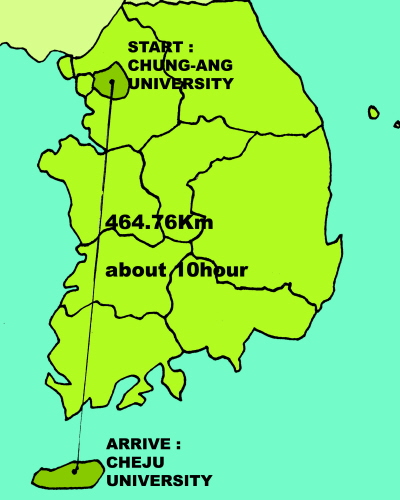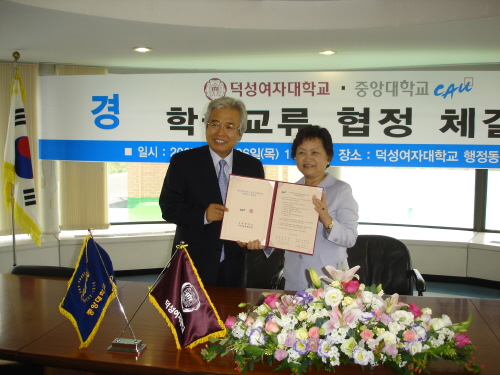‘The frog in the well knows nothing of the great ocean.’ Since childhood, many of us have heard this proverb, and wanted to widen our mental horizons. Therefore, we learned many fields of study, or went on a trip abroad. Beside those activities, there is another program. It is ‘the Cross Registration System’. This semester, the University Administration will continue to make progress in ‘the Cross Registration System’ with other universities, who also participated last semester. Yet, many students do not participate in this program, because they do not know what it is. It is time to find the reason, and fix this great program to help students.
The Cross Registration System was introduced in 1997.
The aim of the Cross Registration System is to give more class selections to students, and to reinvigorate exchanges among the universities. The Ministry of Education states the requirements for exchanges in Articles 9, and 23 of the Higher Education Act. The Ministry of Education recommends the Cross Registration System to universities on one background condition. They said that the number of participants and classes must reflect well in the evaluations of each university. For this reason,
What is the merit of the Cross Registration System? For the university, it can not only increase academic exchanges among the universities’ professors and research projects, but also strengthen university competitiveness through inter-university contributions. ‘Many hands make light work’. The Cross Registration System helps accomplishment that, which no single university can do alone.
For students, the Cross Registration System broadens the choices of courses. It allows students to get more detailed knowledge or access to knowledge in a particular subject, which they want to have. It also helps widen their knowledge by exchanging opinions with students from other universities. Furthermore, keeping in touch with students from other universities expands the students’ human relationships. Lastly, the Cross Registration System helps students to experience the atmosphere at another university; students are encouraged by the differences of their own university.
Despite the Cross Registration System’s benefits, students rarely apply. In fact, many students do not even know about this good system. This indicates that the Cross Registration System has some problems. So then, let’s inquire into the cause.
First, the application process of the Cross Registration System is complicated. Also the method of application for courses is different with each university, many students become confused.
In addition,
Third, the limitation of registration causes a waste of student’s time. Despite The Ministry of Education’s recommendation that a student can register for up to 12 credits, some universities limit registration to 6 credits. This means that during a semester a student could go to their original university one day, and then go to the cross registration university the next or both in the same day.
Fourth, there is a problem with geographical locations. For example,
Fifth, this has to do with the deteriorated and insufficient facilities. Even though a university accepts many students, they do not have enough space, such as class rooms, to offer students.
Lastly, public relations (PR) of universities about the system are insufficient. Therefore, the Cross Registration System is unknown to most students. About 51.2 % of university students do not know about the Cross Registration System, according to a survey by Campus times. Furthermore, the number of exchange universities with
The Cross Registration System has several problems. Then, how can we fix the problem?
Inconvenience with the application process can be solved by using the Internet. When they keep pace with the times, universities can widen their range of vision toward the digital era. In this case, students do not have to submit applications by direct contact with a professor in charge, an adviser and the chairman, but they are given permission to apply by using the Internet. When the cross registration students apply for courses, universities should treat them the same as their own university students. Since the meaning of the Cross Registration System is to give chances to students, universities must put away their discriminations about other university students.
And the maximum number of credits for registration to the Cross Registration System should be kept to the regulations according to The Ministry of Education’s recommendation, which increases registration up to 12 credits at another university. Top private and public universities avoid the Cross Registration System, because they think that it will deprive their own university’s students. So some universities have a limitation on the number of students they accept. Universities have to get rid of this passive position.

The problems with distance can be possibly solved with a summer program. The University offers a dormitory for students at this summer program, and the university gives temporary student’s identification for students of Cross Registration System. Then, students can use facilities. Lastly, a combined homepage is necessary to increase the exchanges between the universities.
When you want to apply for the Cross Registration System, you have to pay attention to these matters.
1) Check whether the university has put in an operation application of courses by order of arrival or not.
2) Check whether the class will conclude graduation registrations or not.
3) Check where you have to pay registration fees.
You must make sure about the information concerning these three items.
At this point in time, cooperation and exchange among universities are more important than before. In addition, the Cross Registration System is clearly a sufficient condition for accomplishing goals. It is necessary to come together. Some universities that are located nearby have made a strong arrangement with each university. For instance, there are many universities in Shin-Chon,


